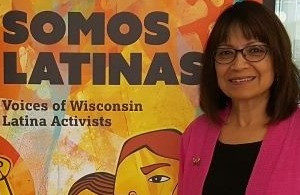For Andrea-Teresa “Tess” Arenas, the founder and leader of the Wisconsin Latinx History Collective (WLHC), the idea to create the history collective by and for Latinx people came from her work on her recently published book “Somos Latinas: Voices of Wisconsin Latina Activists.”
“I wrote [the] book with my dearest friend Eloisa Gomez, and felt like the public response to documenting our history was so positive,” Arenas said. “We did book tours and I had students on various campuses come up in tears telling us how important Somos was to helping them look at their own parents, or older relatives who have been active in the community. And so I inferred from that that there is a real thirst for our history to be recognized within Wisconsin. And so for me, this was a natural transition to create the Wisconsin Latinx History Collective.”
“It was an expansion of Somos,” she added.
The Wisconsin Latinx history collective is an organization created in partnership with the Wisconsin Historical Society (WHS) and the UW–Madison Chican@ & Latin@ Studies Program and will spend the next five years documenting the history of Latinx people in the state of Wisconsin.
Officially created in January of last year, the collective began with the meeting between Arenas and four other academics, including historian and UW–Madison assistant professor Dr. Marla Ramírez Tahuado; UW–Madison Associate Professor with the School for Workers Dr. Armando Ibarra; cultural anthropologist and assistant professor of geography and Chican@ & Latin@ studies Dr. Almita Miranda; and assistant professor of Latinx Studies at Marquette University Sergio González.
Together, the team charted out the goals of the collective which will be to ”retro fit Latinx his history into the state historical narrative” via the collection of oral histories from Latinx people across the state of Wisconsin, according to Arenas.
Beyond simply the documentation of Latinx experience in Wisconsin, Arenas noted the collective work will push back against the national trend of “demonizing” of both Latinx people and immigrants alike, which has been “amplified” by the previous presidential administration.
“I was trying to figure out, how do you combat this national narrative of hate and suspicion. And I thought about, you know, I can issue, or Chican@ & Latin@ Studies at (UW) Madison, could issue a policy statement or a brown paper or white paper about why we’re important and why we don’t deserve discrimination,” Arenas explained. “It lasts as long as somebody posts, right?
“The collective work is a lasting way to combat that kind of thinking. Just because Trump is gone, doesn’t mean the hate is gone,” Arenas said. “The seeds have been planted by that bastard, and they’re still resonating with his cult-like followers, and we can’t afford that. And so by creating a long-lasting, public record that will never go away, through the Historical Society, is my take on combating this hate that we’ve been experiencing.”
Currently, the collective has 80 members made up of a variety of faculty, staff, and students from UW–Madison, Madison College, UW-Whitewater, UW-Milwaukee, Viterbo University, and UW-Parkside, as well as both community researchers and leaders from Milwaukee, Madison, Green Bay, and Waupaca spanning across myriad of Latinx ethnic groups.
Arenas noted that it was imperative that the collective seek members from outside of the academic community.
“You can’t have just academics looking at our history,” Arenas said. “We all have our discipline, lenses, and biases, and that can lead to ignoring other developments, and then we have the community members who are doing interviews and documenting and it brings in a whole new perspective.”
Although the work is set to be completed in the next five years, Arenas “can envision the work going beyond 2025.”
“The goal is to increase the holdings at the historical society, so that the state and the nation understand who we are from our perspective, and I think that’s key,” Arenas concluded.
Folks interested in volunteering for the WLHC can contact Andrea-Teresa Arenas at [email protected]




























